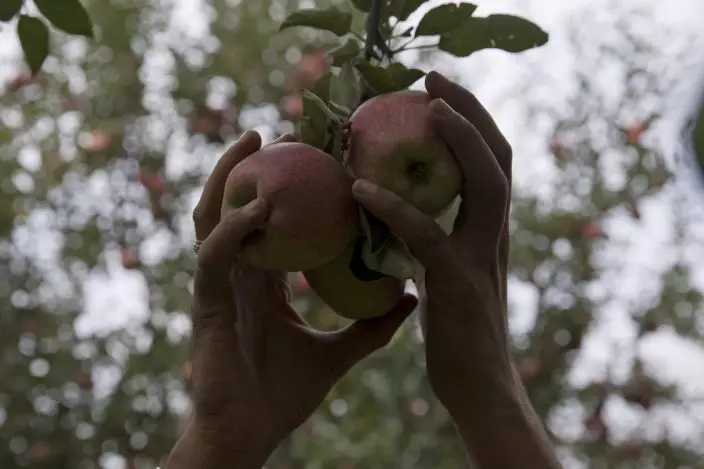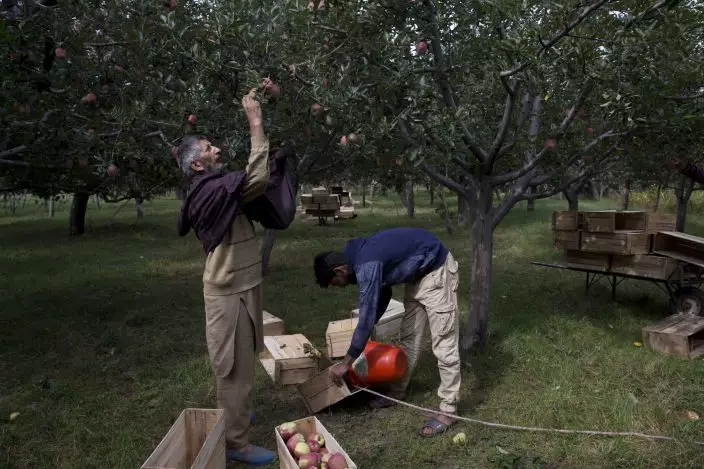Kashmir's apple orchards, a backbone of the economy that supports nearly half the people living there, are deserted, crops rotting on the trees at a time when they should be bustling with harvesters.
Losses are mounting as insurgent groups pressure pickers, traders and drivers to shun the industry to protest an Indian government crackdown.
In August, Prime Minister Narendra Modi's Hindu nationalist-led government stripped Kashmir of its semi-autonomous status and imposed a strict crackdown.

In this Sunday, Oct. 6, 2019 photo,Kashmiri farmers drink tea during a break at an orchard in Wuyan, south of Srinagar Indian controlled Kashmir. The apple trade, worth $1.6 billion in exports in 2017, accounts for nearly a fifth of Kashmir’s economy and provides livelihoods for 3.3 million. This year, less than 10% of the harvested apples had left the region by Oct. 6. Losses are mounting as insurgent groups pressure pickers, traders and drivers to shun the industry to protest an Indian government crackdown. (AP PhotoDar Yasin)
More than two months later, the region remains under a communications blockade.
Apple growers were expecting a bumper crop this year. Now, they say, losses are in the millions of dollars and the business might suffer its worst year since the beginning of the insurgency that has resulted in almost 70,000 deaths.

In this Sunday, Oct. 6, 2019, photo, a Kashmiri farmer plucks apples inside his orchard in Wuyan, south of Srinagar Indian controlled Kashmir. The apple trade, worth $1.6 billion in exports in 2017, accounts for nearly a fifth of Kashmir’s economy and provides livelihoods for 3.3 million. This year, less than 10% of the harvested apples had left the region by Oct. 6. Losses are mounting as insurgent groups pressure pickers, traders and drivers to shun the industry to protest an Indian government crackdown. (AP PhotoDar Yasin)

In this Sunday, Oct. 6, 2019, photo, Kashmiri farmer Sheeraz Ahmad plucks apples in his neighbor's orchard in Wuyan, south of Srinagar Indian controlled Kashmir. The apple trade, worth $1.6 billion in exports in 2017, accounts for nearly a fifth of Kashmir’s economy and provides livelihoods for 3.3 million. This year, less than 10% of the harvested apples had left the region by Oct. 6. Losses are mounting as insurgent groups pressure pickers, traders and drivers to shun the industry to protest an Indian government crackdown. The despair trickles down to unskilled workers like 22-year-old Ahmad, who was counting on 45 days of work to earn more than $400 to help support his family. So far, he’s only gotten five days of work. (AP PhotoDar Yasin)

In this Sunday, Oct. 6, 2019 photo, a Kashmiri farmer Imtiyaz Ahmad transports apples on a wheelbarrow inside his orchard in Wuyan, south of Srinagar Indian controlled Kashmir. The apple trade, worth $1.6 billion in exports in 2017, accounts for nearly a fifth of Kashmir’s economy and provides livelihoods for 3.3 million. This year, less than 10% of the harvested apples had left the region by Oct. 6. Losses are mounting as insurgent groups pressure pickers, traders and drivers to shun the industry to protest an Indian government crackdown. (AP PhotoDar Yasin)

In this Sunday, Oct. 6, 2019 photo, a Kashmiri farmer Imtiyaz Ahmad plucks apples at his orchard in Wuyan, south of Srinagar Indian controlled Kashmir. The apple trade, worth $1.6 billion in exports in 2017, accounts for nearly a fifth of Kashmir’s economy and provides livelihoods for 3.3 million. This year, less than 10% of the harvested apples had left the region by Oct. 6. Losses are mounting as insurgent groups pressure pickers, traders and drivers to shun the industry to protest an Indian government crackdown. (AP PhotoDar Yasin)

In this Sunday, Oct. 6, 2019 photo, a Kashmiri farmer Jamshed Ahmad plucks apples at his orchard in Wuyan, south of Srinagar Indian controlled Kashmir. The apple trade, worth $1.6 billion in exports in 2017, accounts for nearly a fifth of Kashmir’s economy and provides livelihoods for 3.3 million. This year, less than 10% of the harvested apples had left the region by Oct. 6. Losses are mounting as insurgent groups pressure pickers, traders and drivers to shun the industry to protest an Indian government crackdown. (AP PhotoDar Yasin)

In this Sunday, Oct. 6, 2019, photo, a Kashmiri man plucks apples at an orchard in Wuyan, south of Srinagar, Indian controlled Kashmir. Kashmir’s apple orchards, a backbone of the economy that supports nearly half the people living there, are deserted, crops rotting on the trees at a time when they should be bustling with harvesters. Losses are mounting as insurgent groups pressure pickers, traders and drivers to shun the industry to protest an Indian government crackdown. (AP PhotoDar Yasin)


